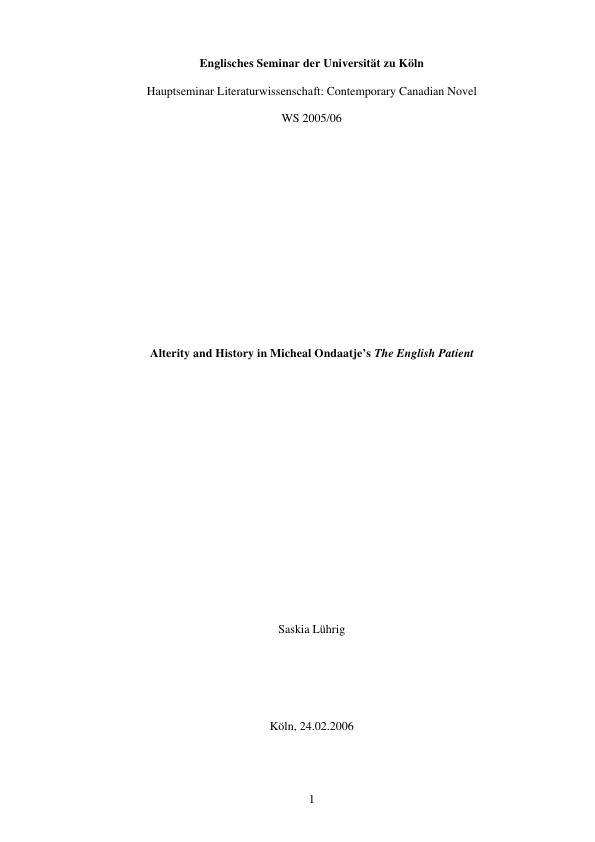In Michael Ondaatje’s novel The English Patient, the notions of alterity and history play an important and interconnected role. It is set in the last days of World War II and is full of historical hints. The characters in the novel spend the last days of the war in a villa in Italy. Hana, the Canadian nurse, and her patient, whose identity is unknown at first as he is deformed after a plane crash, form an alternative community. Caravaggio, who worked for British Intelligence in North Africa, and Kip, an Indian Sikh and sapper in the British army, are the other two members of this community. The author himself stated in the acknowledgements that “characters who appear are fictional, as are some of the events and journeys” (322). Now the question arises, to which extent these characters and events are based on “true” historical facts. But parallel with this the question of “historical truth” is raised. Hence, this paper will discuss in which way and why Ondaatje fictionalised historical material. Furthermore, the novel deals with the way history is written and shows through its fragmented style of narration the various ways history is recorded and the problems of “historical truth” as a universal concept.
Strongly connected with Ondaatje’s treatment of history is the notion of the Other in the novel. To understand the way alterity is used it is necessary to give a short definition of the term and to outline its relevance in literary theories. The notion of alterity is concerned with the definition of identity in contrast to the Other. In The English Patient, the East as the Other and the Western treatment of this concept of Otherness are represented, on the one hand, by the various characters in the novel as they try to reconstruct their identity by depicting the Other. This will be shown especially in the case of the English Patient and Kip. On the other hand, the notion of alterity can be found in the novel’s intertexts which illustrate how the concept of Otherness was treated by authors and historians and in which way the characters in the novel are dealing with it.
[...]
Inhaltsverzeichnis (Table of Contents)
- Introduction
- History
- Historical Background of Michael Ondaatje's The English Patient
- Representation of Recording of History in The English Patient
- Alterity
- Definition
- Alterity in the Case of Kip
- Alterity in the Case of the English Patient
- Alterity in the Novel's Intertexts
Zielsetzung und Themenschwerpunkte (Objectives and Key Themes)
This paper examines the interconnected roles of alterity and history in Michael Ondaatje's The English Patient. It investigates how Ondaatje fictionalizes historical material, explores the novel's representation of historical recording and the challenges to the concept of "historical truth," and analyzes the concept of alterity as it relates to the characters and the novel's intertexts.
- The fictionalization of historical events and characters in The English Patient.
- The novel's representation of the recording and interpretation of history.
- The concept of alterity and its significance in defining identity within the novel.
- The exploration of East-West relationships and the portrayal of "Otherness."
- The impact of historical events and trauma on individual characters.
Zusammenfassung der Kapitel (Chapter Summaries)
Introduction: This chapter introduces the central themes of alterity and history in The English Patient, setting the stage for the analysis of how these concepts are intertwined within the novel's narrative and characters. The chapter also introduces the main characters and the setting of the novel.
History: This section delves into the novel's depiction of history from multiple perspectives, examining the ways in which Ondaatje utilizes historical knowledge and constructs historical narratives. It explores the relationship between historical accuracy and fictional representation in the novel.
Historical Background of Michael Ondaatje's The English Patient: This section focuses on the historical background of the novel, exploring the real-life counterparts of some characters and events, and discussing Ondaatje's approach to using historical facts and fictional elements. The analysis examines the extent to which the novel aligns with historical accuracy while considering the author’s own statements on the work's purpose.
Representation of Recording of History in The English Patient: This section explores how the novel depicts the ways history is recorded and the resulting complexities and potential inaccuracies. It examines the fragmented narrative style and how it reflects the subjective nature of historical accounts.
Schlüsselwörter (Keywords)
Michael Ondaatje, The English Patient, alterity, history, historical fiction, World War II, postcolonialism, identity, trauma, narrative fragmentation, "historical truth".
- Quote paper
- Saskia Lührig (Author), 2006, Alterity and History in Micheal Ondaatje’s "The English Patient", Munich, GRIN Verlag, https://www.grin.com/document/123440




